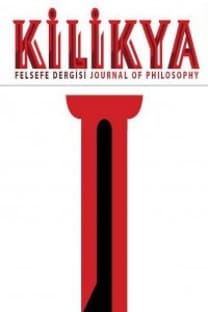Taylor’ın Liberal Anlayışında Ahlak, Dil ve Politika Teorilerinin Etkileşim Noktaları Üzerine Bir Değerlendirme
Charles Taylor, içinde yaşadığı kültürün ve genel anlamda Batı dünyasının yaşadığı sorunları, ortaya koyduğu liberal politika anlayışı kapsamında çözüme ulaştırmaya çalışan önemli bir yirminci yüzyıl düşünürüdür. Politika felsefesinin yerini politika yapma eğilimine bıraktığı yirminci yüzyılda, Taylor ortaya koyduğu anlayış ile bu eğilimden kendini ayırır. Ona göre, yaşadığı çağın sorunlarının üstesinden gelebilmek için ortaya konulan tezlerin ahlaki bir motivasyona da sahip olması gerekir. Dolayısıyla Taylor için yapılması gereken şey, modernitenin insan doğasında birtakım ahlaki sezgilerin varolduğu tezine geri dönmek ve dilin dolayımında kendini bulan insanı, ahlaki bir varlık olarak düşünmektir. Taylor’a göre, dili kullanarak kendini ve içinde bulunduğu durumu yorumlayan bir hayvan olarak insan, pratik aklın yol göstericiliğinde, sahip olduğu ahlaki sezgilerden hareketle, yönünü bulmaya ve yaşadığı bu süreci ifade eden kendi anlatısını oluşturmaya çalışır. Taylor’ın arzu ettiği liberal toplumun yapı taşını oluşturacak olan bu birey, ahlaki alanda yolunu, ahlaki sezgilerinden hareketle keşfettiği “iyi” anlayışı ile belirler. Bu “iyi” anlayışı temelde dilin dolayımında kendini gösteren “hermeneutik döngü” anlayışı ve insan doğasının diyalojik karakteri kapsamında kendini gösterir. Kişi hermeneutik döngü sayesinde, hem kendi iyisini hem de içinde yaşadığı toplumun iyisini kavrayan, bu iyiyi yeniden yorumlayabilen bir benlik anlayışına sahip olur. Böylece Taylor’da dilin dolayımında, kişinin ahlaki olarak sahip olduğu kendi “iyi” anlayışı ile ilişkilerinin yönünü belirleyen “kamusal iyi” anlayışı içiçe geçmiş olur. Bu bağlamda çalışmamız, Taylor’ın anlayışında ahlak, dil ve politika üçlüsünün birbirleriyle temasta olduğu bu noktaları göstermeyi ve onların birbirleri ile nasıl bir ilişki kurduğunu serimlemeyi amaçlamaktadır.
An Evaluation About the Intersection Points of Moral, Language and Political Theories in Taylor’s Liberal Perception
Charles Taylor is an important 21st century-thinker who tries to solve the problems of the culture he is living in and of the Western world in general within the liberal policy context. In the 21st century, in which political philosophy has given its placed to making policy, Taylor spares himself from this tendency with the perception he reveals. According to him, it is necessary for the revealed theses to have, also, a moral motivation in order to be able to cope with the problems of the age he is living in. Therefore, the thing to be done by Taylor is to turn back to the modernity’s thesis that there are some moral intuitions in human nature and to think the human being, having found itself in language mediation, as a moral existence. According to Taylor, a human being as an animal interpreting themselves and the situation, they are in by using the language, tries to find their direction and form their own narration expressing this period they experienced, under the guidance of practical mind and depending on moral intuitions they have. This individual to form the building block of liberal society Taylor desires determined their path in a moral direction with the perception ‘good’ he discovered depending on moral intuitions. This understanding of ‘good’ reveals itself within the understanding of ‘hermeneutic cycle’ showing itself mainly in language mediation and dialogical character of human nature. The person gets an understanding of self that comprehends both his good and that of the society he lives in and that can interpret this good again, thanks to hermeneutic cycle. Therefore, in the mediation of language in Taylor, the human’s own-choice “good” understanding and “public good” understanding that determined the direction of relationships become intertwined. Within this context, our study aims to show the points that moral, language and politics triple are in touch with each other in Taylor’s understanding and to make explosion of how these three are in relation to each other.
___
- Bayart, J. F. (1999). Kimlik Yanılsaması (İskender Savaşır, çev.). Metis Yayınları, İstanbul.
- Bogdan, C. (2007). Charles Taylor and the (modern) self. Studia Political Science Review, 7 (2), 423-445.
- Chrzanowska, K. (2017). Who Am I? Taylor’s Selfhood and The Transcendental Condition of Conversation. Internetowy Magazyn Filozoficzyn Hybris 4 (39), 1-18.
- Clark, S. R. L. (1991). Taylor’s Waking Dream: No One’s Reply. Inquiry, Vol: 34, No: 2, Usa, 195-215.
- Kymlicka, W. (1991). The Ethics of Inarticulacy. Inquiry, Vol: 34, No: 2, USA, 155-182.
- MacIntyre, A. (1994). Critical Remarks on The Sources of The Self. Philosophy and Phenomenological Research, Vol: 51, No: 3, 187-190.
- Müftüoğlu, A. (2000). Rawls, Rorty ve Taylor’ın Demokrasi Anlayışlarında Birey ve Kollektivitenin Yeri. Basılmamış Doktora Tezi. Ege Üniversitesi, İzmir.
- Olafson, F. A. (1994). Comments On the Sources of the Self by Charles Taylor. Philosophy and Phenomenological Research, Vol: 54, No: 1, USA, 191-196.
- Readhead, M. (2002). Thinking and Living Deep Diversity. Rowman&Littlefield Publishers, Inc., Lanham.
- Rorty, R. (1994). Taylor on Self-Celebration and Gratitude. Philosophy and Phenomenological Research, Vol: 54, No: 1, USA, 197-201.
- Rosen, M. (1991). Must We Return to Moral Realism? Symposium: Charles Taylor’s Sources of the Self. Inquiry 34: 183-94.
- Taylor, C. (1984). Hegel: History and Politics. Liberalism and Its Critics. (ed.) Sandel Michael j., Basil Blackwell, GB, 177-200.
- Taylor, C. (1985a). Philosophical Papers, Vol: I. Cambridge University Press, USA.
- Taylor, C. (1985b). Philosophical Papers, Vol: II. Cambridge University Press, USA.
- Taylor, C. (1989). Sources of The Self: The Making of Modern Identity. Harvard University Press, USA.
- Taylor, C. (1990). Philosophy and History. Philosophy in History. (ed.) Richard Rorty, Schneewind J. B., Skinner Quentin, Cambridge University Press, USA, 17-31.
- Taylor, C. (1991). The Ethics of Authenticity. Harvard University Press, England.
- Taylor, C. (2006). Modern Toplumsal Tahayyüller. (H. Koyukan, çev.). İstanbul: Metis Yayınları.
- Taylor, C. (2010). Tanınma Politikası (Y. Salman, çev.). Çokkültürcülük ve Tanınma Politikası (Amy Gutman, ed.). Yapı Kredi Yayınları, İstanbul.
- Taylor, C. (2012). Benliğin Kaynakları (Selam Aygül Baş ve Bilal Baş, çev.). Küre Yayınları, İstanbul.
- West, C. (1989). Hegel, Hermeneutics, Politics: Areply to Charles Taylor. Cardozo Law Review 10 (5/6), 871-876.
